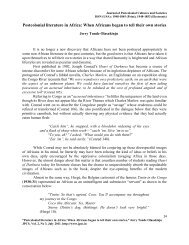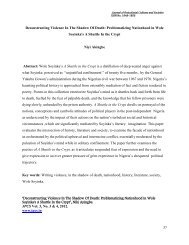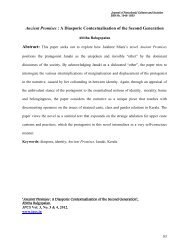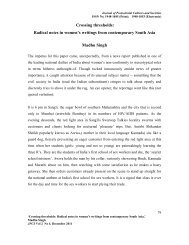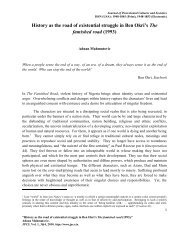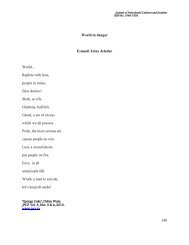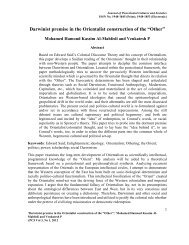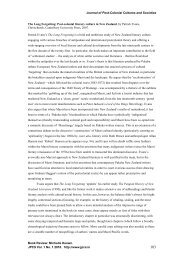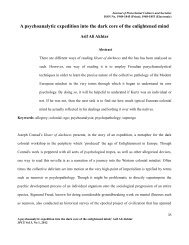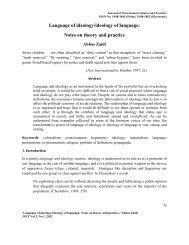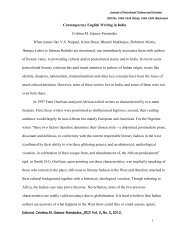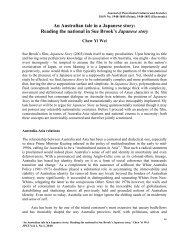The seeds of violence in domesticity: The case of post ... - JPCS
The seeds of violence in domesticity: The case of post ... - JPCS
The seeds of violence in domesticity: The case of post ... - JPCS
Create successful ePaper yourself
Turn your PDF publications into a flip-book with our unique Google optimized e-Paper software.
Journal <strong>of</strong> Postcolonial Cultures and Societies<br />
ISSN (USA): 1948-1845 (Pr<strong>in</strong>t), 1948-1853 (Electronic)<br />
conformity out <strong>of</strong> the corporate archive <strong>of</strong> nationhood needs an agency mediat<strong>in</strong>g uniformity: the<br />
refusal <strong>of</strong> a national eukumene imposes a regulative device, one which would be able to act at a<br />
horizontally extended but closely controlled level. Thus the basic procedures <strong>of</strong> <strong>in</strong>clusion and<br />
exclusion are delegated to the authority <strong>of</strong> the traditional family circle through the control <strong>of</strong><br />
<strong>in</strong>dividual behaviour and the imposition <strong>of</strong> pre-orda<strong>in</strong>ed patterns <strong>of</strong> identity, which constitute a<br />
consequent specific character <strong>of</strong> Indianness.<br />
This double edge both implies toleration and at the same requests conformity. Toleration<br />
is conveyed <strong>in</strong> the film by the domestic bridge – <strong>of</strong> course a two-way passage from one house to<br />
the other, but an episodic <strong>in</strong>terconnection not meant family people to opt <strong>in</strong> or out <strong>of</strong> their<br />
specific cultural frameworks. <strong>The</strong> H<strong>in</strong>du young man born unknow<strong>in</strong>gly to him a Muslim<br />
<strong>in</strong>scribes fanaticism <strong>in</strong> his cultural code, as an excessive sign <strong>of</strong> adhesion to a found<strong>in</strong>g notion <strong>of</strong><br />
corporate purity. Thus the only <strong>in</strong>stance <strong>in</strong> the film <strong>of</strong> full transition with<strong>in</strong> a presumptive unity<br />
leads to a personal behaviour <strong>of</strong> rupture and separation. It would perhaps be possible to analyze<br />
the feel<strong>in</strong>g <strong>of</strong> active hostility thrust forward by the young man as a confused mnestic semiawareness<br />
<strong>of</strong> his dim<strong>in</strong>ished identity as a nagari, a citizen <strong>of</strong> the nation. To him not bee<strong>in</strong>g a<br />
H<strong>in</strong>du means separation from himself, a personal Partition which makes him remember his own<br />
true identity as a lost and non-existent self.<br />
<strong>The</strong> partitioned condition <strong>of</strong> this character <strong>in</strong>dicates exile with<strong>in</strong> or shared nationhood, a<br />
status which might equated to what happened to the refugees at the Partition. We could possibly<br />
quote a recent collection <strong>of</strong> S<strong>in</strong>dhi short stories, Unbordered Memories (2009), <strong>in</strong> which the<br />
enforced separation from the native regional place endorses loss and estrangement. This attitude<br />
generates a retrospective and f<strong>in</strong>ally regressive time-lag which erases the present from any<br />
positive consciousness, by substitut<strong>in</strong>g it with abstract culture (or its alter egoes, religion or<br />
ethnicity or whatever k<strong>in</strong>d <strong>of</strong> belong<strong>in</strong>g <strong>in</strong> the social sphere), so as to make the subject live and<br />
act <strong>in</strong> a static vacuum. We might take what happens to the Muslim boy <strong>in</strong> the film as an extended<br />
metaphor <strong>of</strong> pre-modern tolerance, one which emphasizes culture, religion, ethnicity et alia as<br />
values that cannot be exchanged or mediated and fully <strong>in</strong>tegrated one another.<br />
To ensure legitimacy <strong>in</strong> nationhood the <strong>in</strong>vention <strong>of</strong> H<strong>in</strong>dustan as a select land (“a very<br />
good country” as a man <strong>in</strong> a Benares gully whispered to the pass<strong>in</strong>g-by foreigners), the<br />
<strong>in</strong>strumental choice <strong>of</strong> <strong>domesticity</strong> as an added moral value was and still is the corporate agency<br />
for the general effort to control society and make it homogeneous. Domesticity meant and still<br />
means the refusal <strong>of</strong> Western ways <strong>in</strong> private life and the emphasis <strong>of</strong> difference <strong>in</strong> morality. So<br />
difference becomes the characteriz<strong>in</strong>g all-mark <strong>of</strong> identity <strong>in</strong> the Independent Indian nation.<br />
However, <strong>in</strong> this discourse difference assumes a restricted mean<strong>in</strong>g s<strong>in</strong>ce it does not entail a<br />
horizontal spread<strong>in</strong>g, one which would allow transversal <strong>in</strong>tersections with<strong>in</strong> the multi-faced<br />
national communities, but fosters <strong>in</strong> its stead a hierarchical pyramid.<br />
Of this structural division <strong>in</strong> the national body casteism constitutes undoubtedly the most<br />
blatant and usavoury side. <strong>The</strong> question is set rather sentimentally <strong>in</strong> the film Sujata (1960), <strong>in</strong><br />
which the issue <strong>of</strong> adoption (an untouchable orphaned girl jo<strong>in</strong>s a high-caste family) highlights<br />
her controversial domestic status, simultaneously <strong>of</strong> someone which is <strong>in</strong>side or outside the<br />
authorized family circle. <strong>The</strong> emotional tension <strong>in</strong> the film splits the young woman <strong>in</strong> the<br />
domestic text between a daughter <strong>of</strong> the house and an embarass<strong>in</strong>g outcaste whose role cannot<br />
actually exceed the subaltern position <strong>of</strong> a servant. This further <strong>in</strong>stance <strong>of</strong> toleration with<strong>in</strong> the<br />
social range cuts at least symbolically across the guidel<strong>in</strong>es <strong>of</strong> which will be the politics <strong>of</strong><br />
“<strong>The</strong> <strong>seeds</strong> <strong>of</strong> <strong>violence</strong> <strong>in</strong> <strong>domesticity</strong>: <strong>The</strong> <strong>case</strong> <strong>of</strong> <strong>post</strong>-Independence India,” Alessandro Monti<br />
<strong>JPCS</strong>, Vol. 2, No 3, July 2011. http://www.jpcs.<strong>in</strong><br />
82



